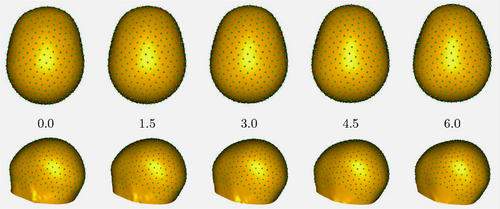Difference between revisions of "Particle Based Shape Regression"
| (One intermediate revision by the same user not shown) | |||
| Line 1: | Line 1: | ||
__NOTOC__ | __NOTOC__ | ||
| − | + | [[Image:HeadRegressionResult.png|500px|Changes in early head shape with log(age).]] | |
| − | |||
| − | |||
| − | Image:HeadRegressionResult. | ||
| − | |||
==Key Investigators== | ==Key Investigators== | ||
| Line 38: | Line 34: | ||
2. M Datar, J Cates, P T Fletcher, S Gouttard, G Gerig, R Whitaker, "Particle Based Shape Regression of Open Surfaces with Applications to Developmental Neuroimaging," MICCAI 2009 | 2. M Datar, J Cates, P T Fletcher, S Gouttard, G Gerig, R Whitaker, "Particle Based Shape Regression of Open Surfaces with Applications to Developmental Neuroimaging," MICCAI 2009 | ||
</div> | </div> | ||
| + | |||
| + | Back to [[2010_Summer_Project_Week#Projects|Projects List]] | ||
Latest revision as of 17:42, 8 June 2010
Home < Particle Based Shape RegressionKey Investigators
- Utah: Manasi Datar, Joshua Cates, P. Thomas Fletcher, Sylvain Gouttard, Guido Gerig, Ross Whitaker
Project
Objective
Shape regression promises to be an important tool to study the relationship between anatomy and underlying clinical or biological parameters, such as age. We propose a new method to building shape models that incorporates regression analysis in the process of optimizing correspondences on a set of open surfaces. The statistical significance of the dependence is evaluated using permutation tests designed to estimate the likelihood of achieving the observed statistics under numerous rearrangements of the shape parameters with respect to the explanatory variable.
Approach, Plan
The general strategy of this method is to represent correspondences as point sets that are distributed across an ensemble of similar shapes by a gradient descent optimization of an objective function that quantifies the entropy of the system [1]. Our proposed extension to this method incorporates a linear regression model into the correspondence optimization. We also present a new methodology for correspondence optimization on open surfaces where surface boundaries are defined by arbitrary geometric constraints.
Progress
The proposed method has been implemented and integrated with the ShapeWorks package. The figure above shows results on clinical MRI data related to early development of the human head, described in [2]
References
1. J Cates, P T Fletcher, M Styner, M Shenton, R Whitaker, "Shape modeling and analysis with entropy-based particle systems," Information Processing in Medical Imaging (IPMI 2007), LNCS 4584. (2007) 333–345
2. M Datar, J Cates, P T Fletcher, S Gouttard, G Gerig, R Whitaker, "Particle Based Shape Regression of Open Surfaces with Applications to Developmental Neuroimaging," MICCAI 2009
Back to Projects List
